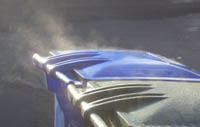
Purpose
To determine whether heat or air flow causes water to evaporate the fastest.
Additional information
The rate of water evaporation applies to many real life situations, such as when wetness on the ground dries after rainfall. Rain in the summer is evaporated by heat, whereas rain in the spring is often evaporated by wind. This experiment will help you find out which method of water evaporation is the most efficient.
Sponsored Links
Required materials
- 3 sponges
- Measuring cup
- 3 plastic plates (not paper)
- 1 gallon distilled water
- Portable electric heater
- Portable electric fan
- Journal
- Clock or timer
Estimated Experiment Time
A few days.
Step-By-Step Procedure
- 1. Place each dry sponge on a plastic plate.
- 2. Measure ½ cup distilled water and pour over all three sponges. Each sponge should only get ½ cup distilled water.
- 3. Place one sponge aside. You will not use the heater or fan on this sponge – it will be your control.
- 4. Place the second sponge in front of the portable electric heater. Make sure that it is not close enough to the heater to cause a fire hazard and is in a safe place where no children or pets can come into contact with the heater and get hurt. Make sure no other objects are close enough to the heater to cause a fire hazard – you will need an adult’s help with this!
- 5. Place the third sponge in front of the fan.
- 6. Time how long it takes for each sponge to completely dry. It may take overnight for the control sponge to dry. Record results in your journal and graph.
Note
You will need an adult’s supervision while using the portable electric heater and the portable electric fan.
Observation
Which sponge dried the quickest – the sponge exposed to heat or the sponge exposed to air flow? How does this compare to the control sponge that did not have either heat or air flow helping it to dry? How long did it take for each sponge to dry?
Result
It is likely that the sponge exposed to heat will dry the quickest. Based on the information gathered in your experiment, how fast do you think rain is evaporated on a hot summer day? How fast do you think rain is evaporated on a cool, windy day? How fast do you think rain would evaporate on a hot, windy day?
Sponsored Links
Take a moment to visit our table of Periodic Elements page where you can get an in-depth view of all the elements,
complete with the industry first side-by-side element comparisons!